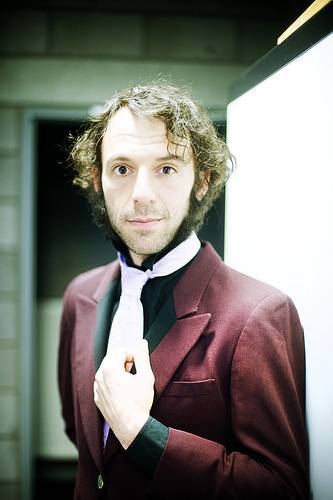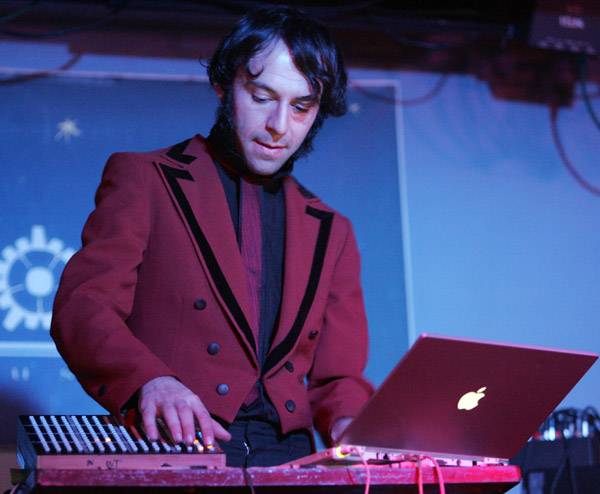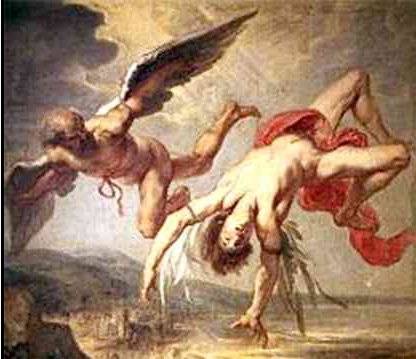 I had the opportunity to interview experimental electronica artist, Daedelus (Alfred Darlington). He is based in Los Angeles, California, attended University of Southern California Thorton School of Music, pioneered the use of the Monome, and is currently touring Europe promoting his new album, Bespoke (Released April 11th 2011, Ninja Tune). I spoke with him over the phone, hours before a show in Paris; here’s what he had to say.
I had the opportunity to interview experimental electronica artist, Daedelus (Alfred Darlington). He is based in Los Angeles, California, attended University of Southern California Thorton School of Music, pioneered the use of the Monome, and is currently touring Europe promoting his new album, Bespoke (Released April 11th 2011, Ninja Tune). I spoke with him over the phone, hours before a show in Paris; here’s what he had to say.
SP: When did you learn you had an interest in music?
Daedelus: I had very ill defined interest in music. I just knew I was obsessed with the source of sound but not sure how to make it or like, what role it would play in my life; I just knew it was the central part of my existence. I mean, I had friends, and I had good friends, but I still was kind of an inward facing child. I mean, in hindsight it seems like that was the case, a lot of time rumbling around in my own head. But that isn’t to discourage the outside influences. LA is full of wonderful sounds. On the radio dial there used to be a lot of opportunity, and there used to be a lot of wonderful record stores as well, that fed into the thing that it became I guess, the real obsession it became later.
SP: At what point did you start playing?
D: it was in elementary school, actually. I mean, I grew up in a school district, which had a charter program to start kids earlier in music, and it probably exists to this day. I was able to play clarinet, for instance, at the age of like, seven or six. Now, that wasn’t my first choice; I really wanted to play bassoon, but I was a little bit too much of a pee-wee kid I guess. I had a growth spurt later that would have allowed it, but not at the time.
SP: When did you start listening to electronic music?
D: It was pretty soon afterwards actually. My first brush with music that really excited me, when I was like four or five, was Parliament Funkadelic. It was a friend of a friend of the family who used to manage Parliament, or at least George Clinton. I don’t know if he was the manager or the dealer, I don’t know… but I had all the records as a kid, and I really bugged out to the sounds. Y’know, a lot of 80’s production for Parliament was really electronic, it was amazingly electronic, they were doing things that still to this day astound me. Also, just the radio dial in general in the late 80’s was full of bleeps and bloops, mostly in the hip house and acid house, odd urban music basically.
But when I really discovered electronic music for myself was in like ’92 or ’91. I began to pick up these rave records from the UK, and those were full of sounds that really astounded me, because it was a cross point, a meeting point for a lot of my obsessions in classical and jazz music meeting in dance music. It’s a really heady sound.
SP: So you found that your fascination for electronic music grew out of your interest and knowledge of classical and jazz music?
D: They were two divergent rivers for a long time; they were two totally separate streams. And then you had this one point, this one meet up of the music in this rave sound, and that blew me away, I didn’t know that was possible, that those things could come together.
SP: Was it at that point you started composing your own music? Did you actively have an interest in DJing, or were you more interested in experimenting with the instruments you already knew how to play?
D: Double bass and bass clarinet were my main instruments at that point, and I was experimenting playing in different ensembles, playing in ska groups and jazz groups and rock groups. I was trying to figure out how it all worked. To be honest, when I heard electronic music, all I heard was complication, all I heard was how difficult it must be to make it using synthesizers and sequencers and programs, and I couldn’t even get my head around it. So I was mostly composing music for the instruments I could play. Even when I started DJing I didn’t know how [electronic performers] were making the sounds, I was still so full of exuberance towards it, excitement towards the music, I just wanted to take part in it however I could, and that was Djing for a while.
 SP: When did you learn how electronic performers created the music that they did?
SP: When did you learn how electronic performers created the music that they did?
D: Well, I started going to a university for jazz studies, studying double bass. At the same time, there was all these electives, music classes for synthesizers and for learning some electronic music composition. I took those classes like, eight times; I took those classes so much that I had to drop out of the jazz program and be a general music major, because I was so interested in how these things were happening. That’s really where I started to “cut my teeth.” I was also doing a lot of college radio at the time, this one station with a lot of really like-minded people for electronic music. Just by chance, the most amount of electronic music programming in the country was happening at our college, and so I was meeting a lot of other people that were really expanding my vocabulary towards electronic music. It wasn’t just me alone in my room anymore listening to these weird records, it was now a whole group of people that were really celebrating the sounds.
SP: At what point did you start getting into experimental instruments, namely the Monome?
D: Y’know, that came a lot later. I’d been dabbling in some circuit bending and non-traditional electronic instrumentation, a lot of guitar pedals and sequencers, just trying to find a way of expressing the sounds in a studio. A real peril of electronic music is that you spend all this time crafting the sound, and when it comes to reproducing that sound again, it can be really tricky, because so much goes into the sound design, so much goes into the exact sound of the snare drum, the exact sound of your kick drum when electronically reproduced. It’s difficult. Instruments like the Monome, where you can really play a sample, has opened so many doors. It’s less about it being experimental now, because it all used to be experimental, because electronic music only exists in that form. So now, it’s more about crafting the exact sound you want, which is incredible.
SP: In a live setting, electronic music is very solitary. That is, you can create the entirety of the experience by yourself. Do you find that limiting or liberating?
D: It’s definitely both. It’s totally the case that you’re up on stage and you can make any of your musical universe come alive, right? I mean that is an amazing ability, but it’s also paralyzing, because people know there’s infinite choice. They’re not there to have a specific experience, they’re there to have everything at all times. If you can imagine being a DJ, and somebody comes up and asks for, y’know, the latest Lady Gaga track or something, that stuff you put up with as a DJ, but when you’re an electronic performer, people want the inside of their brains to be painted out on the wall, not to get too metaphorical, but it’s true and you’re kind of responsible for that.
And then also the flip side, as a solitary performer, its hard to find excitement, hard to get people really moving. I’ve played in bands and it’s so much easier when you can look at the guitarist, y’know turn over to the drums and have them carry things for a bit. It’s truth. People are wired for a band experience, and to be a solitary performer, that’s another challenge. There’s all this expectation.
Going against expectation is a beautiful thing that happens in music. I mean, you have call and response, you have all these different music gestures. But with electronic music, it almost becomes impossible cause people are so open, they’re so prepared for whatever, you have to create this tension, create these expectations. Oh my god, it gets really complicated really fast!
SP: In a recorded sense, this type of music actually lends itself to collaboration through the use of samples and vocal talent. There’s a lot of collaboration on your new album, with vocalists especially. Was there any reason for this?
D: Yeah, I mean, I’m fully a fan of the people I was working with. I definitely intentionally chose them, but at the same time, I really wanted the texture of their voices. They are the feature instruments; they are the soloists. And even if there’s lyrics- and by having lyrics they become more similar to traditional songs- you can’t just cut up their words totally without paying some respect to it. In the case of Bilial, who’s kind of known for his neo-soul stuff, he was definitely interested in doing something different with his voice as an instrument. So on the track, I intentionally leave him kind of just a little further back, and it makes it a little bit haunting, cause he’s not only talking about being loved, but that’s also the kind of character he wanted to assume. As an instrument, we can kind of get a little deeper because of electronic elements, but also because this is the power of where we’re at. Our ears are so conditioned for voices, but when you tweak that a little bit, it becomes something else, something new.
SP: How did you go about choosing the artists on this album? Was it to achieve some sort of thematic unity throughout? Are they people you know and wanted to work with?
D: A lot of the people I wanted to work with for a while, but specifically for these tracks, this collection, I thought they it would really call out, it would really sing. I mean, having Baths on a track that’s quite dizzy, kind of overwhelming in its own way, and at the same time, his voice against the French voice, a double lyricism that’s going, and they’re talking about very different things. The tension that’s there and the rhythm that’s there, it’s all something I really wanted to cast. The only person that I think could pull it off would be Baths, for instance. And so, there were a lot of these little moments of people who were really specific, and this record is a testament to that.
SP: On the whole, do you feel your live show or a recorded album is a more authentic experience of your music?
D: Ah you see, this is…I’ve been fighting this for a while. They both are valid; they both have their own spaces though. The live show is so hell-bent on being in front of people and being reactive to people, something that a record could never be, because it becomes fixed. As soon as you release it, its like this fixed manifesto, and as much as I’d like to go back and continue to tweak the sounds, it’s done, the thing is done. It’s baked and cooked, and now presented as edible for an audience. And it sits in a continuum of other records that have come out. People can pick and choose the songs they want versus the live show, I don’t stop in between tracks. I kind of present things as being a whole block as an hour, two hours of sound. Because it’s so ephemeral, it doesn’t fit into a continuum of other tracks, and people might have a preference from a previous live engagement.
The truth of the matter is it’s so made for the group of people. I can’t even imagine a recording of it being necessarily as interesting as being live because of how reactive it is. So, they’re both kind of their own poisons. I really do wish that I could sometimes just go out and play the record, and I have on a few occasions with different ensembles. It’s a different experience; it resembles something else. And live… I really wish I could commit that in a meaningful fashion to a recording so that people could have that experience, because it is so vastly different than the record.
 SP: Can you talk about how you came up with the name “Daedelus?” What significance does it have for your music and you as a person?
SP: Can you talk about how you came up with the name “Daedelus?” What significance does it have for your music and you as a person?
D: Well, speaking of that early alone time, that pre-time before I found my voice in music or even in life, I was not only obsessed with music, but the thing I really wanted to be, the thing I thought would be my future, was to be an inventor. I really idolized this idea of invention, this idea of creation. My middle name used to be Alva, and of course, the other famous Alva is Thomas Alva Edison. So, at a young age, I kind of had an awareness of inventors and patents, this construction idea. One of the other early stories that I heard was Daedelus and Icarus, Daedelus being the most famous inventor of the ancient Greek age. And so this name was kind fixed in my mind.
There’s another important thing, when you become a DJ or an electronic performer, you’re often asked, “What is the name? What is your alias?” cause that’s expected. You can’t be yourself, because that’s never extraordinary to be yourself. You have to pull out a name; you have to pull out an alias of some kind. For me it was less about having a distinct identity that was separate from my own, and it was more about having an aspiration.
I’ve always aspired to be an inventor, but because of a failing of math skills and being quite dyslexic it never was my future. But I kind of felt in small way that if I could create something in sound, if I could create an emotion in sound, it would be significant. Daedelus, over time I’ve found to be very fitting, because not only is he an inventor, but he also had flaws, like real, terrible flaws. I feel that’s really important as a musician, to bear your flaws to a degree, to kind of witness them. If you’re not telling a story that’s compelling, you’re just twiddling your thumbs. So sometimes it’s not for me as much as my namesake that I can pull these stories from.
SP: You mentioned that there needs to be an alias, a stage appearance for electronic performers, but you also mentioned that it’s important to “bear your flaws.” How do you reconcile those two things? How do you present something extraordinary on stage, while also bearing your flaws?
D: You can never escape yourself. No matter how many aliases nor how much costume I don on stage, it’s gonna be me. I mean, when I see these performers that wear sunglasses, that are all cool on stage, I know that’s the mask they’re trying to adopt. They’re trying to hide something about themselves, what they’re not able to do. And for me, everything’s a celebration, because I’m a fan of music, and I’m just there, trying my hardest I guess. I’m just doing what I would want to hear, trying to play to the dancers that are out there, trying to play to the people that are reacting to whatever it is, by vocals or by movement, just trying to keep pace with them. I know I’m gonna fail. I know I’m not gonna suit everyone, but just that awareness alone kind of helps push the thing forward.








